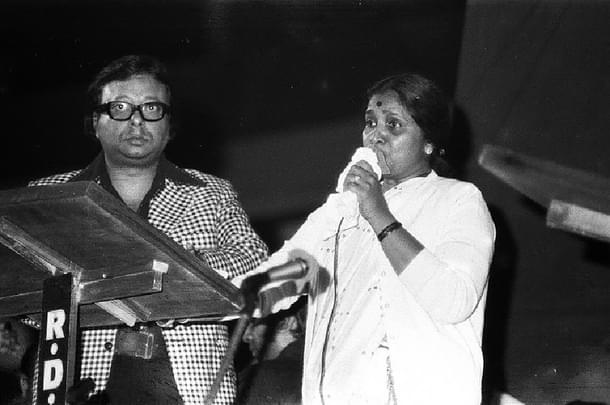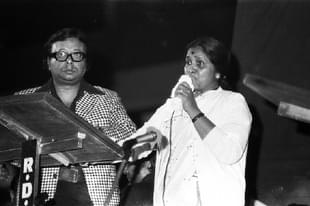Culture
Different Shades of Pancham
Biswadeep Ghosh
Jun 27, 2016, 06:05 PM | Updated 06:05 PM IST
Save & read from anywhere!
Bookmark stories for easy access on any device or the Swarajya app.


For lovers of Hindi music, today’s Google doodle featuring the legendary music director R.D. Burman- to commemorate his 77th birth anniversary- will evoke numerous memories from the past that refuse to blur out even today. For Burman, a composer who merged Indian and Western influences effortlessly, was as much at home with jazz as he was with Bangla folk. He took forward his father S.D. Burman’s legacy, with his innovative music and left an indelible mark on the history of Hindi film music.
It was in 1966 that Burman made significant inroads into the business, by composing the music of ‘Teesri Manzil’, the Shammi Kapoor starrer directed by Vijay Anand. ‘Oh Mere Sona Re’, ‘Aaja Aaja Main Hoon Pyar Tera’, ‘Deewana Mujhsa Nahin’- hits flowed from the soundtrack effortlessly, which showed a young man following his father’s footsteps. Hardly easy to emulate, some would have said. Impossible, the cynics would have insisted. But, by the time Burman had established himself as a music director, many doubts had dried up.
Today, when we cast a look at his career, it is impossible not to take note of the fact that Burman bagged as many as 18 nominations for ‘Best Music Director’ at the Filmfare awards. He won for three films: ‘Sanam Teri Kasam’ in 1982, ‘Masoom’ in 1983 and ‘1942: A Love Story’ in 1994, an award that he received posthumously. Living as we now do in the times of superficial Westernisation that mars many Hindi film songs, Burman’s eclectic mix would have led to many more wins.
Every Hindi film music lover who isn’t trapped in the space of modern times will have his or her list of favourite Burman songs. Songs none can, or should, leave out are ‘Yeh Shaam Mastani’ and ‘Pyar Deewana Hota Hai’ (‘Kati Patang’, 1970), ‘Piya Tu Ab Tu Aaja’ (‘Caravan’, 1971), ‘Raina Beeti Jaye’ (‘Amar Prem’, 1972), ‘Beeti Na Beetai Raina’ (‘Parichay’, 1972), ‘Ek Ajnabee Haseena Se’ (‘Ajanabee’, 1974), ‘Tere Bina Zindagi Se’ (‘Aandhi’, 1975), ‘Bade Acche Lagte Hai’ (‘Balika Badhu’, 1976), ‘Ai Ri Pawan’ (‘Bemisal’, 1982), and ‘Chehra Hai Ya’ (‘Saagar’, 1985).
Despite the torrent of songs unleashed on us on a weekly basis, how do we remember such golden hits? We remember because the range of songs showcases Burman’s comfort while composing West-influenced melodies, as well as many others that reveal his mastery over the Indian space. An innovator by instinct, he sought new frontiers and reached there. Just think of it. Here was a man who used cups and saucers to produce moments of percussion in ‘Churaliya Hai’ (‘Yaadon Ki Baarat’, 1973)! Such ideas define the man and his temperament.
If Burman made several statements in the 1970s, fighting a battle in the decade that followed was an uneasy experience. Amitabh Bachchan’s ‘Angry Young Man’ image was so dominant that music, the ‘real thing,’ was struck by mediocrity. Mithun Chakraborty became a big star, introducing the disco dance syndrome which was masterminded by Bappi Lahiri. The disco phase was a disaster, convincing mediocre vocalists and composers that it was possible to market songs with short shelf lives but which are instant hits, nonetheless.
Despite the influx of tasteless music that held the masses captive, Burman’s work was instrumental in the debut of three star-sons- Sunny Deol (‘Betaab’, 1983), Kumar Gaurav (‘Love Story’, 1981) and Sanjay Dutt (‘Rocky’, 1981). Deol and Dutt went on to become big stars, while Gaurav couldn’t capitalise on his dream beginning. But that is a different story.
Singer Kishore Kumar, with whom he had worked with in as many as 32 films, passed away in 1987. Burman continued to collaborate with his friend Gulzar, and also produced melodious tracks like ‘Tu Rootha To Main Ro Doongi Sanam’ (‘Jawaani’, 1984) and ‘Roz Roz Aankhon Tale’ (‘Jeeva’, 1986).
More interestingly, it was during this period that Burman produced his two award-winning soundtracks: ‘Sanam Teri Kasam’ and ‘Masoom’. But his output, which was on the decline in the 1980s, received well-deserved acknowledgement when he received an award for the soundtrack of ‘1942: A Love Story’ after his death, in 1994.
The memories of R.D. Burman’s legacy will live on. Can we have some songs like the ones he composed, please?
Image credits: Aditijain/Wikimedia Commons
Having started out as a journalist at 18, Biswadeep Ghosh let go of a promising future as a singer not much later. He hardly steps out of his rented Pune flat where he alternates between writing or pursuing his other interests and and looks after his pet sons Burp and Jack.





